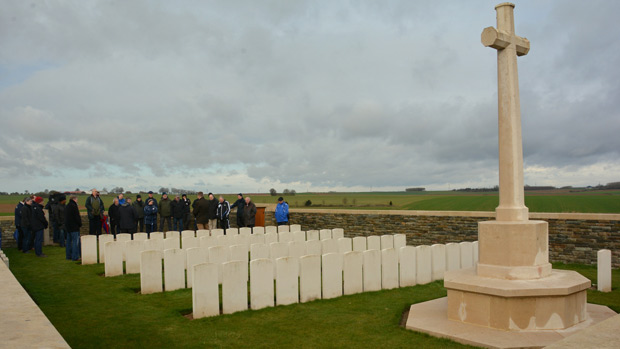March 19th was the beginning of a wonderful weekend for football. 42 goals were scored in the Premier League and the tension was thick in the Football League and brought a FA Trophy final at Wembley, plus a particular fixture in Spain.
However, as Saturday’s matches ended in England, and a whistle was blown in Northern France to commemorate a very different event. A football family came together to mark the centenary of World War One and representatives from the sport joined together at the memorial for the Footballers’ Battalion in the village of Longeuval. The day of remembrance began as a rainy one, however soon the sun would shine down on those who traveled to the memorial. The Football League organized the trip as a part of the opening act for what is the fourth year of the footballers coming together to pay their respects.
League representative, Andy Williamson, Mike Foster of the Premier League, and FA Chairman Greg Dyke came together to lay a wreath at the memorial. A shrill blast from a referee’s whistle was blown to begin two minutes of silence, in order for everyone to reflect on where they’ve been and what they have seen. The journey began with boarding of a coach in central London; bound for the coast and a quick trip on the train which would lead to group sites of the Somme. This was a large action that continued from July to November in 1916 and it claimed the lives of nearly 20,000 British troops on the first day.
The tour went through the battlefields and cemeteries, the stories of people who lost their lives were brought to life by Andrew Riddoch and the ex-soldier-turned-footballer, Phil Stant. The Football League and been urged to play a role in the Great War, merely 50 years after the laws for the game had been codified with the foundation in 1863. Ultimately, no other sport had to suffer as many casualties—whether wounded or slain.
Dyke stated that the trip was organized by the Football League. The Chairman reflected on the lives lost, the letters that were sent. He was awe-struck by enormity of the losses. The first Footballers’ Battalion, the 17th Middlesex, contained players, referees, and officials from all over the nation. The men were persuaded to join with their friends so they could be united in courage, athletic and valiant men looking for a great adventure.
The Football Association shares one by one, visitors came to pay their respects by telling the players’ stories. Howard Wilkinson, Brendon Batson and Richard Bevan, represented the coaches, players, and administrators. Among those who seemingly revived Donald Bell from the dead. Bell was the focus of a very powerful grave-side service and the ceremony concluded with him finally receiving his Victoria Cross with thinks to the work of the Professional Footballers’ Association and National Football Museum.
Others to be singled out included Walter Tull—one of the first well-known black footballers in the football league with Tottenham Hotspur and Northampton Town. Tull was able to rise through the ranks and became an officer, despite all odds. Then there was the former PFA head, Evelyn Lintott and Major Frank Buckley who both would go on to be a manager of distinction.
Letters that were written at the time were being shared. One letter was written by the sister of a private, Horace Isles, who was only 16. In the letter, the girl begged her brother to tell officers of his true age and return to Yorkshire. He never made it home. The tour went through Delville Wood, which once was the stage for gruesome scenes of brutality and carnage, now is a lovely area which you could relax. The only telling sign of the horrors that befallen the wood was the large memorial and the grassed over craters that told the true story of what had happened there.
Upon a visit to a German cemetery served as a reminder of the devastation and sacrifice which was felt on both sides. Sunday morning before the tour went back to London, the Chairman gave a moving speech after the tour through Oppy Wood—the scene for the worst day of the war for the footballers. Dyke shared a tribute to the dead that had once been given by Charles Clegg. Clegg was a former president and chairman of the same governing office.
While passers-by went about their day unaware of the tribute, the touring party was riveted to the speech. Dyke shared his personal connection to the tragedies of yesteryear during the war. He recounted that his grandmother lost 3 brothers, and Dyke watched as his grandmother would cry. He continued his story by saying that his grandmother raised her brothers because they were orphans and once they were killed, she was alone.
Because of this personal connection, Dyke was able to speak so passionately about the tragedies, the lives lost, and honoring their memories.





